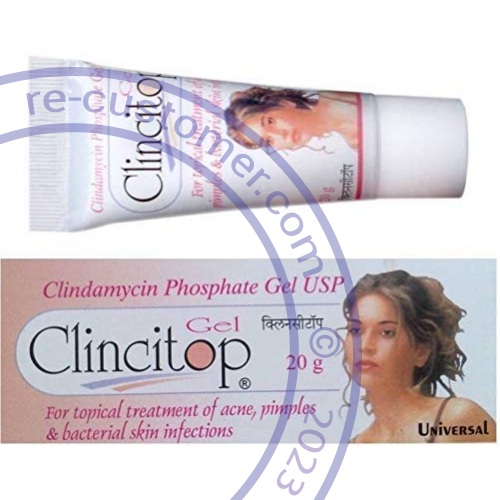- Trusted Tablets
- Skin Care
- Clindagel

Brand(s): Clincitop / Clinka
Manufacturer: Cipla Ltd. / Intas Biopharmaceuticals
Disease(s): Acne
| Package | Price | Per tube | Savings | Order |
|---|---|---|---|---|
| 1% 10g × 5 tubes | $ 79.95 | $ 15.99 | $ 94.80 | Add to cart |
| 1% 10g × 4 tubes | $ 72.95 | $ 18.24 | $ 66.85 | Add to cart |
| 1% 10g × 3 tubes | $ 64.95 | $ 21.65 | $ 39.90 | Add to cart |
| 1% 10g × 2 tubes | $ 53.95 | $ 26.98 | $ 15.95 | Add to cart |
| 1% 10g × 1 tube | $ 34.95 | $ 34.95 | Add to cart |
Clindamycin topical
What is clindamycin topical?
Clindamycin topical (for the skin) is used to treat severe acne in adults and children who are at least 12 years old.
Clindamycin topical may also be used for purposes not listed in this medication guide.
Important Information
You should not use clindamycin topical if you have ulcerative colitis or enteritis (inflammation of your intestines), or if you have ever had severe diarrhea caused by antibiotic medicine.
Before taking this medicine
You should not use clindamycin topical if you are allergic to clindamycin or lincomycin, or if you have:
- inflammation of your intestines (also called enteritis);
- ulcerative colitis; or
- if you have ever had severe diarrhea caused by antibiotic medicine.
Tell your doctor if you have ever had:
- eczema or other skin problems; or
- an intestinal disorder.
It is not known whether this medicine will harm an unborn baby. Tell your doctor if you are pregnant or plan to become pregnant.
If you are breastfeeding, tell your doctor if you notice diaper rash, diarrhea, or signs of stomach pain in the nursing baby. If you apply clindamycin foam to your chest, avoid areas that may come into contact with the baby's mouth.
Clindamycin topical is not approved for use by anyone younger than 12 years old.
How should I use clindamycin topical?
Follow all directions on your prescription label and read all medication guides or instruction sheets. Use the medicine exactly as directed.
Do not take by mouth. Topical medicine is for use only on the skin. Do not use on open wounds or on sunburned, windburned, dry, or irritated skin.
Read and carefully follow any Instructions for Use provided with your medicine. Ask your doctor or pharmacist if you do not understand these instructions.
Shake clindamycin topical lotion well before each use.
Wash your hands before and after applying this medicine.
Call your doctor if your symptoms do not improve, or if they get worse.
If you need surgery, tell your surgeon you currently use this medicine. You may need to stop for a short time.
Store at room temperature away from moisture and heat.
Keep the clindamycin topical foam canister away from an open flame or high heat. Do not puncture the canister or throw an empty canister into a fire.
What happens if I miss a dose?
Apply the medicine as soon as you can, but skip the missed dose if it is almost time for your next dose. Do not apply two doses at one time.
Overdose symptoms include bloody or watery diarrhea, which may result if you absorb clindamycin topical through your skin by applying too much.
What should I avoid while taking clindamycin topical?
Do not smoke while using clindamycin topical foam, or immediately after applying it. The contents of the foam canister are flammable.
Antibiotic medicines can cause diarrhea, which may be a sign of a new infection. If you have diarrhea that is watery or bloody, call your doctor. Do not use anti-diarrhea medicine unless your doctor tells you to.
Rinse with water if this medicine gets in your eyes or mouth.
Do not use other medicated skin products unless your doctor has told you to. Avoid using skin products that can cause irritation, such as harsh soaps, shampoos, or skin cleansers, hair coloring or permanent chemicals, hair removers or waxes, or skin products with alcohol, spices, astringents, or lime.
Clindamycin topical side effects
Get emergency medical help if you have signs of an allergic reaction: hives; difficult breathing; swelling of your face, lips, tongue, or throat.
Stop using clindamycin topical and call your doctor at once if you have:
- severe redness, itching, or dryness of treated skin areas; or
- severe stomach pain, diarrhea that is watery or bloody (even if it occurs months after your last dose).
Common side effects may include:
- burning, itching, dryness, peeling or redness of treated skin; or
- oily skin.

Can i help you?



